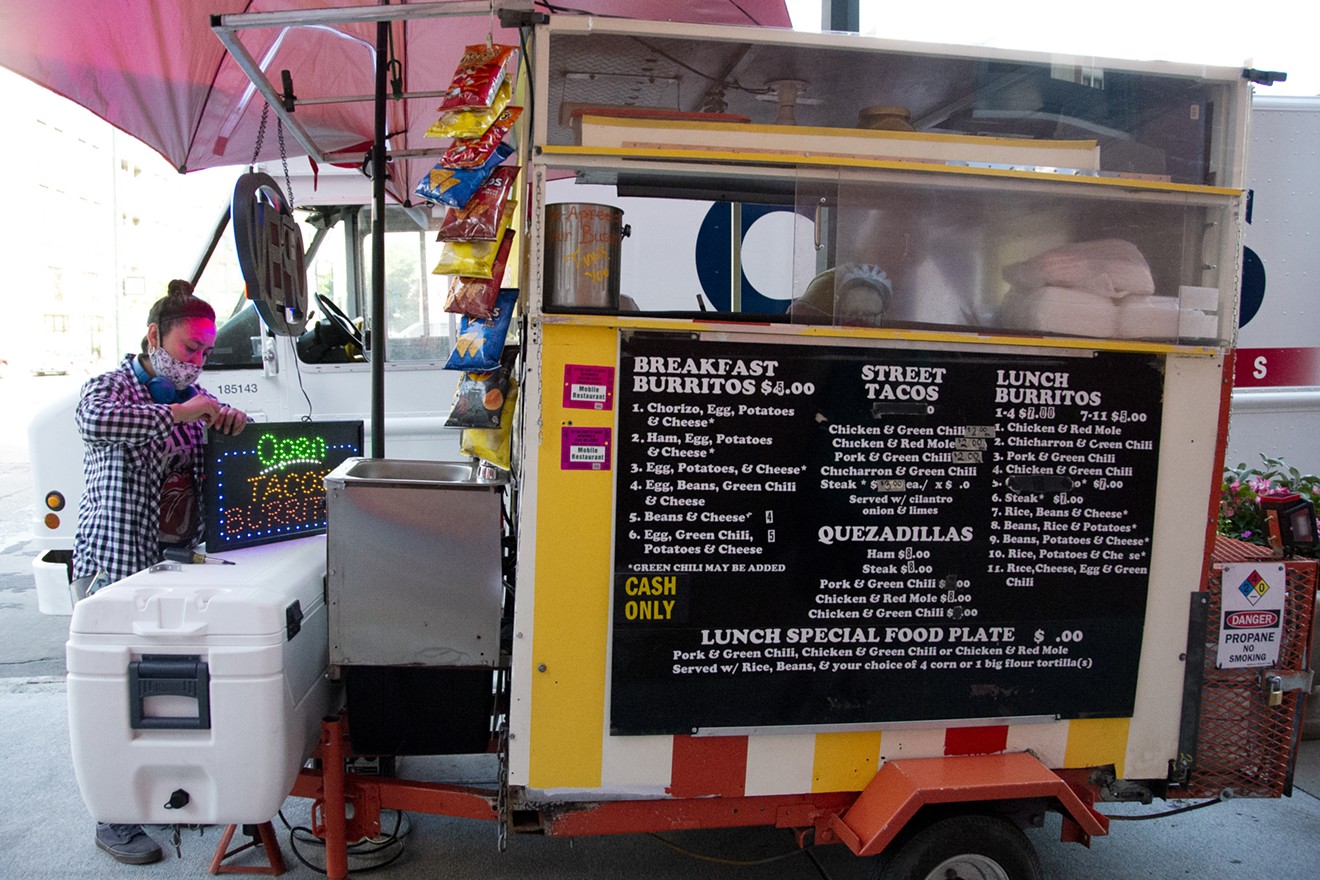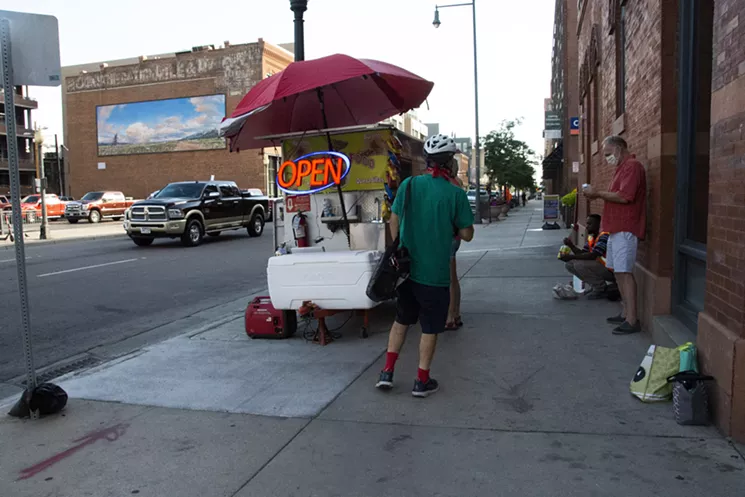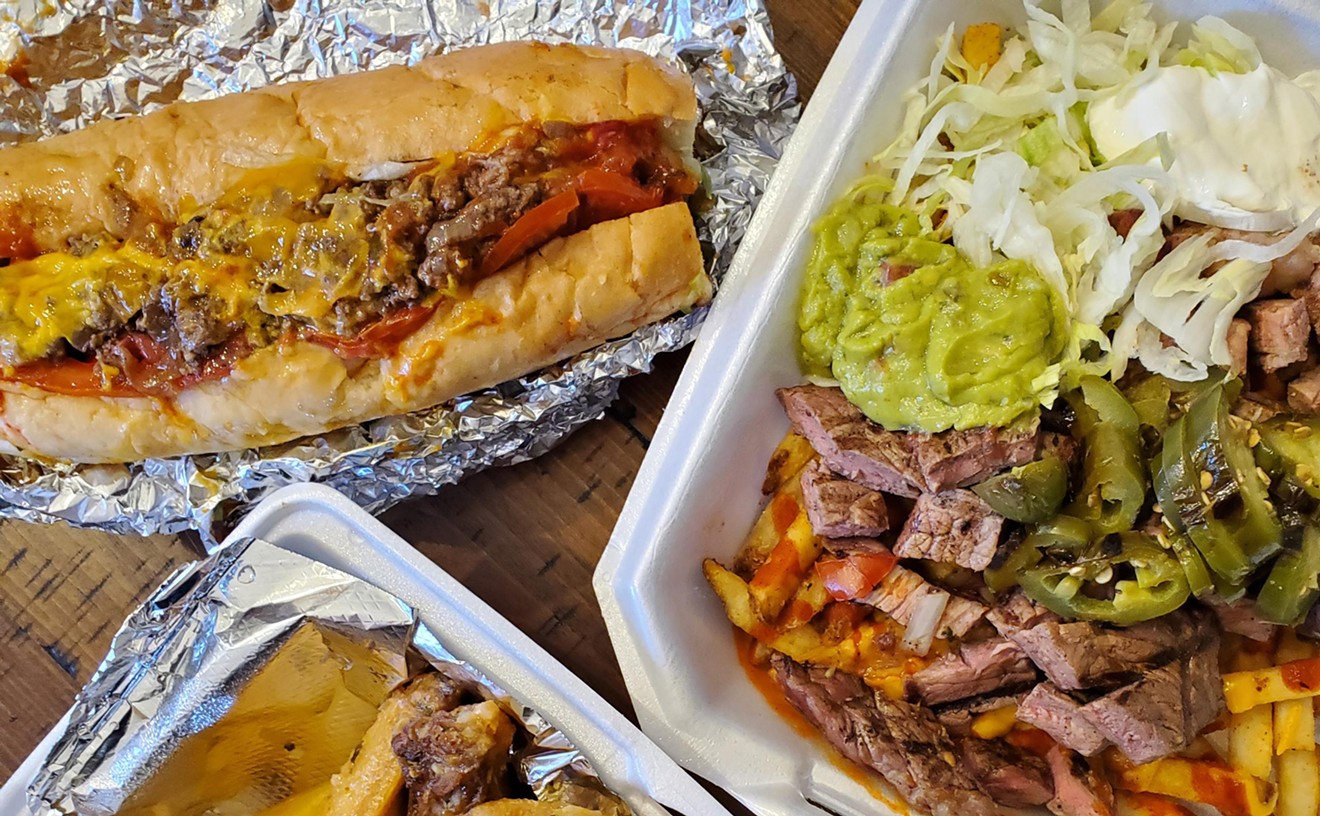Felipa Marquez, the owner of Marquez Food, a taco trailer that's parked on the sidewalk at 17th and Blake streets most weekdays, cries as she thinks about how COVID-19 has changed the world and her life.
On the morning of May 6, Claudio Marquez, her husband, lost his fight with the deadly virus. He'd started showing symptoms sixteen days earlier and was told that he had COVID-19 after being admitted to St. Joseph Hospital. Felipa was also diagnosed with the virus and admitted to the hospital on the same day, but because Claudio had underlying conditions — hypertension and diabetes — the virus attacked his organs at a much quicker rate.
She and Claudio had run Marquez Food together for fourteen years. It’s always been a family business, serving breakfast and lunch burritos, street tacos and quesadillas to downtown office workers Monday through Friday from 8 a.m. to 3 p.m. Claudio built the red-and-yellow-striped stand himself.
Felipa is from Puebla, Mexico; Claudio was born in Hidalgo, Mexico. The two met in 1977 and had four children together. They moved to Los Angeles in 1992 and to Aurora in 2000. Their youngest daughter, Maria, goes to the truck every day to help her mother. She's thirty years old. “It’s my inheritance,” Maria says. “Eventually, I’ll run it solo.”
Maria and Felipa describe Claudio as the hardest-working person they've ever known. An orphan, he grew up on the streets of Mexico City — but he didn’t talk much about that time of his life, Maria says. “My dad was humble and always wanted to work. He was so kind, always wanting to help others, and he taught us all those things,” she says.
When the family had to close Marquez Food in late March to comply with state coronavirus guidelines, Claudio often went downtown just to see how things were going on their corner. The cart reopened in early July without Claudio; his family members say they don't get many customers these days, which they attribute to downtown offices being closed. “I always wake up at 4 a.m. to be ready for clients who come to buy breakfast, but they don’t come,” says Felipa. “They’re scared to come into work.”
While winter months are typically hard for Marquez Food, Felipa and Maria say they've never seen times as trying as these. To make matters worse, everything is harder without Claudio. “It’s so sad,” Felipa says. “I always find myself asking him where things are, or how to fix something, and I can’t.”
Felipa doesn’t know exactly where she and her husband contracted the virus, but she speculates that it might have been at the grocery store or the bank.
Their story isn’t uncommon. While only 30 percent of Denver's population is Hispanic, that group accounts for 53 percent of the city's COVID-19 cases, according to data from Denver Public Health, which has this message on its website: “The issue of COVID’s impact on racial/ethnic minorities is critical, and we know there are clear disparities in diagnoses. Public Health agencies in Denver are working hard to ensure free testing and access to care and resources are available in communities that are most adversely impacted by the COVID epidemic in Denver.”
“These individuals are our front-line workers who are sustaining businesses that are able to stay open during COVID, yet they are the lowest wage earners," says Denver City Councilwoman Debbie Ortega. "Most depend on public transportation — some are bus drivers — and desperately need their jobs to support their families."
Rudy Gonzales, executive director of Servicios de la Raza, an advocacy group that emphasizes service for Colorado's Latinx community, echoes that point. “We’re not able to stay home and do remote, commercial work,” he says. “We’re in jobs that require us to be out in the open and serving the public.”
The City and County of Denver, Denver Public Health and several community organizations have partnered to offer free COVID-19 testing in underserved communities in Denver; the Racial Equity Council under the Mayor’s Office of Social Equity helped identify these locations. Gonzales says that Servicios de la Raza is providing special services and resources during the pandemic, too; it's currently setting up food banks, offering over-the-phone help to apply for SNAP benefits and providing one-on-one counseling and aid.
But Ortega says that more needs to be done. “There should be clear policy on paid sick leave so they are not going to work sick — and exposing others — because they can’t afford to miss a day out of their paychecks," she explains. "We should be making sure that any of the COVID or other funds set aside for small businesses also target/benefit Latino-owned businesses, especially the small ones who don’t know or understand the process to obtain a city/state grant."
To pay for Claudio’s treatment, the family was approved for emergency medical assistance under Medicaid, and they're grateful to have received this financial support when they needed it most. But according to Gonzales, many Hispanic families in Denver don’t have access to this type of aid or don’t feel comfortable applying for it.
For now, family, food, sunshine and small acts of kindness are what give the Marquez family the strength to continue. Felipa has nine grandchildren in Aurora, and they often gather for birthdays, holidays and dinners.
“So many people have died from this,” she says. “All we can hold on to is the hope that we have. We’re going forward and adapting, little by little.”
[
{
"name": "Air - MediumRectangle - Inline Content - Mobile Display Size",
"component": "12017618",
"insertPoint": "2",
"requiredCountToDisplay": "2"
},{
"name": "Editor Picks",
"component": "17242653",
"insertPoint": "4",
"requiredCountToDisplay": "1"
},{
"name": "Inline Links",
"component": "18838239",
"insertPoint": "8th",
"startingPoint": 8,
"requiredCountToDisplay": "7",
"maxInsertions": 25
},{
"name": "Air - MediumRectangle - Combo - Inline Content",
"component": "17261320",
"insertPoint": "8th",
"startingPoint": 8,
"requiredCountToDisplay": "7",
"maxInsertions": 25
},{
"name": "Inline Links",
"component": "18838239",
"insertPoint": "8th",
"startingPoint": 12,
"requiredCountToDisplay": "11",
"maxInsertions": 25
},{
"name": "Air - Leaderboard Tower - Combo - Inline Content",
"component": "17261321",
"insertPoint": "8th",
"startingPoint": 12,
"requiredCountToDisplay": "11",
"maxInsertions": 25
}
]












